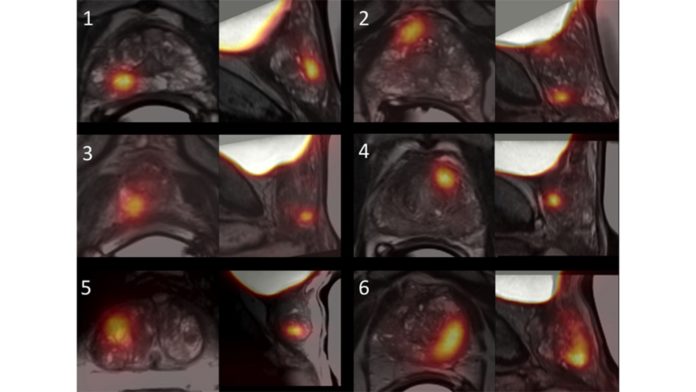By Amanda Taccone
With newly announced studies, Lawson Health Research Institute continues to lead the way in advancing prostate cancer imaging.
Scientists at Lawson are at the forefront of research that uses imaging agents that bind to a protein on the surface of prostate cancer cells called prostate specific membrane antigen (PSMA). Advanced imaging technology called PET/CT (positron emission tomography/computed tomography) and PET/MRI (magnetic resonance imaging) is then used to capture clear images of the location and extent of the cancer.
The first scan of its kind in Canada was captured at St. Joseph’s Health Care London in 2016 by Dr. Glenn Bauman, a Radiation Oncologist at the London Regional Cancer Program at London Health Sciences Centre and Scientist with Lawson.
“We started out with mainly MRI imaging but we’ve developed this very rigorous pipeline that allows us to put the imaging and digitized pathology together,” explains Dr. Bauman.
Early evidence indicates that PSMA PET scans have changed how prostate cancer is being treated, but more work is underway to understand the impact of those treatment changes. Working with imaging specialists there is hope that registries of these scans that are in development could even lead to automated detection of prostate cancer.
The Canadian Cancer Society recently committed $125,000 in funding for the creation of a database of PET/CT prostate cancer scans. Led by Dr. Katherine Zukotynski, an Adjunct Scientist at Lawson, the idea is to make annotated findings accessible to a wider community of medical and research professionals.
“If you have an idea of the amount of disease detected, correlated with what kind of prognosis, then this could be very helpful. It would allow oncologists to compare patients with similar cases, which may help determine the best therapies to try,” Dr. Zukotynski says.
Lawson has also become the first in Canada to enter a sublicense agreement to produce a new PET imaging agent called PSMA-1007 – that may produce even clearer images, especially when there’s a recurrence of cancer.
“PSMA-1007 allows us to detect where the cancer is a lot sooner and take action, whether that’s through surgery or delivering radiation to exactly where the cancer is located,” says Dr. Michael Kovacs, Director of the Lawson Cyclotron & PET Radiochemistry Facility.
Clinical trials have already begun to test PSMA-1007’s efficacy with an ultimate goal of obtaining Health Canada approval.
Amanda Taccone is a Communications Consultant at Lawson Health Research Institute.




